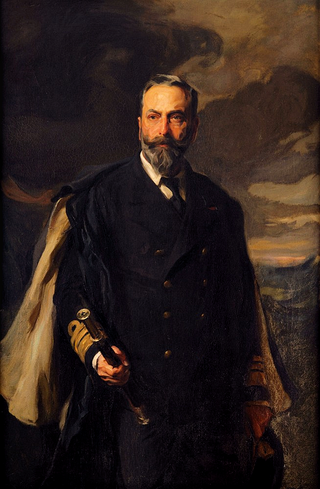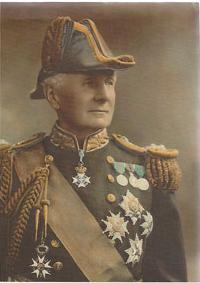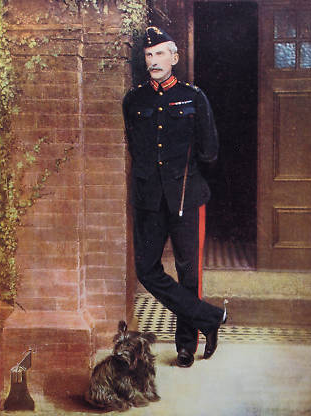
Admiral of the Fleet David Richard Beatty, 1st Earl Beatty, was a Royal Navy officer. After serving in the Mahdist War and then the response to the Boxer Rebellion, he commanded the 1st Battlecruiser Squadron at the Battle of Jutland in 1916, a tactically indecisive engagement after which his aggressive approach was contrasted with the caution of his commander Admiral Sir John Jellicoe. He is remembered for his comment at Jutland that "There seems to be something wrong with our bloody ships today", after two of his ships exploded. Later in the war he succeeded Jellicoe as Commander in Chief of the Grand Fleet, in which capacity he received the surrender of the German High Seas Fleet at the end of the war. He then followed Jellicoe's path a second time, serving as First Sea Lord—a position that Beatty held longer than any other First Sea Lord. While First Sea Lord, he was involved in negotiating the Washington Naval Treaty of 1922 in which it was agreed that the United States, Britain and Japan should set their navies in a ratio of 5:5:3, with France and Italy maintaining smaller ratio fleets of 1.75 each.

Admiral of the Fleet Sir Frederick Charles Doveton Sturdee, 1st Baronet was a Royal Navy officer. After training as a torpedo officer, he commanded two different cruisers and then three different battleships before becoming commander of the 1st Battle Squadron of the Home Fleet. He went on to command the 3rd Cruiser Squadron and then the 2nd Cruiser Squadron.

The Battle of Dogger Bank was a naval engagement during the First World War that took place on 24 January 1915 near the Dogger Bank in the North Sea, between squadrons of the British Grand Fleet and the Kaiserliche Marine. The British had intercepted and decoded German wireless transmissions, gaining advance knowledge that a German raiding squadron was heading for the Dogger Bank and ships of the Grand Fleet sailed to intercept the raiders.

The Naval Intelligence Division (NID) was created as a component part of the Admiralty War Staff in 1912. It was the intelligence arm of the British Admiralty before the establishment of a unified Defence Intelligence Staff in 1964. It dealt with matters concerning British naval plans, with the collection of naval intelligence. It was also known as "Room 39", after its room number at the Admiralty.

Louis Alexander Mountbatten, 1st Marquess of Milford Haven, formerly Prince Louis Alexander of Battenberg, was a British naval officer and German prince related by marriage to the British royal family.

Admiral of the Fleet John Arbuthnot Fisher, 1st Baron Fisher,, commonly known as Jacky or Jackie Fisher, was a British Admiral of the Fleet. With more than sixty years in the Royal Navy, his efforts to reform the service helped to usher in an era of modernisation which saw the supersession of wooden sailing ships armed with muzzle-loading cannon by steel-hulled battlecruisers, submarines and the first aircraft carriers.

HMS Theseus was an Edgar-class protected cruiser of the Royal Navy. The Edgars were similar but smaller versions of the Blake class. Theseus was launched at Leamouth, London in 1892 and commissioned on 14 January 1896.

Room 40, also known as 40 O.B., was the cryptanalysis section of the British Admiralty during the First World War.

Admiral Sir Bertram Home Ramsay, KCB, KBE, MVO was a Royal Navy officer. He commanded the destroyer HMS Broke during the First World War. In the Second World War, he was responsible for the Dunkirk evacuation in 1940 and planning and commanding the naval forces in the invasion of France in 1944.

The Second Battle of Heligoland Bight, also the Action in the Helgoland Bight and the Zweite Seeschlacht bei Helgoland, was an inconclusive naval engagement fought between British and German squadrons on 17 November 1917 during the First World War.

Sir Reginald Aylmer Ranfurly Plunkett-Ernle-Erle-Drax, KCB, DSO, JP, DL, commonly known as Reginald Plunkett or Reginald Drax, was an Anglo-Irish admiral. The younger son of the 17th Baron of Dunsany, he was Director of the Royal Naval Staff College, President of the Naval Inter-Allied Commission of Control in (Berlin), commander-in-chief of successive Royal Navy bases. His brother Edward, who became the 18th Baron of Dunsany, was best known as the famous playwright and author Lord Dunsany. Edward inherited the paternal estates in Ireland, while Reginald was bequeathed most of his mother's inheritance across portions of the West Indies, Kent, Surrey, Dorset, Wiltshire and Yorkshire. He extended his surname by special Royal licence in 1916, and was noted for the quadruple-name result, Plunkett-Ernle-Erle-Drax.

Admiral Sir William Reginald Hall, known as Blinker Hall, was the British Director of Naval Intelligence (DNI) from 1914 to 1919. Together with Sir Alfred Ewing he was responsible for the establishment of the Royal Navy's codebreaking operation, Room 40, which decoded the Zimmermann telegram, a major factor in the entry of the United States into World War I.

Admiral Sir Sackville Hamilton Carden, was a senior Royal Navy officer. He is chiefly remembered for his failure to force the Turkish defenses in the Dardanelles during the First World War, which led to the launch of the ill-fated Gallipoli campaign.

Vice Admiral Sir Reginald Hugh Spencer Bacon, was an officer in the Royal Navy noted for his technical abilities. According to Admiral of the Fleet Lord Fisher, twice First Sea Lord, he was at one time "acknowledged as the cleverest officer in the Navy".

Admiral Sir Francis Charles Bridgeman Bridgeman was a Royal Navy officer. As a captain he commanded a battleship and then an armoured cruiser and then, after serving as second-in-command of three different fleets, he twice undertook tours as Commander-in-Chief of the Home Fleet with a stint as Second Sea Lord in between those tours. He became First Sea Lord in November 1911 but clashed with First Lord of the Admiralty Winston Churchill on technical issues as well as matters relating to a perceived overriding of naval traditions by Churchill: this led to Bridgeman's resignation just a year later.

Admiral Sir William Milbourne James, was a British naval commander, politician and author. He served in the Royal Navy from the early 20th century to the Second World War. During the First World War, he was an integral part of the Naval Intelligence Division in its early years.

Vice-Admiral Kenneth Gilbert Balmain Dewar, CBE was an officer of the Royal Navy. After specialising as a gunnery officer, Dewar became a staff officer and a controversial student of naval tactics before seeing extensive service during the First World War. He served in the Dardanelles Campaign and commanded a monitor in home waters before serving at the Admiralty for more than four years of staff duty. After the war ended he became embroiled in the controversy surrounding the consequences of the Battle of Jutland. Despite this, he held a variety of commands during the 1920s.

Admiral Sir Ernest Charles Thomas Troubridge, was an officer of the Royal Navy who served during the First World War.

General Sir Henry John Thoroton Hildyard, was a British Army officer who saw active service in the Anglo-Egyptian War of 1882 and the Second Boer War. He was General Officer Commanding-in-Chief, South Africa, from 1905 to 1908.
Admiral Sir Reginald Neville Custance, was a Royal Navy officer. He was the eldest son of General William Neville Custance CB.

















